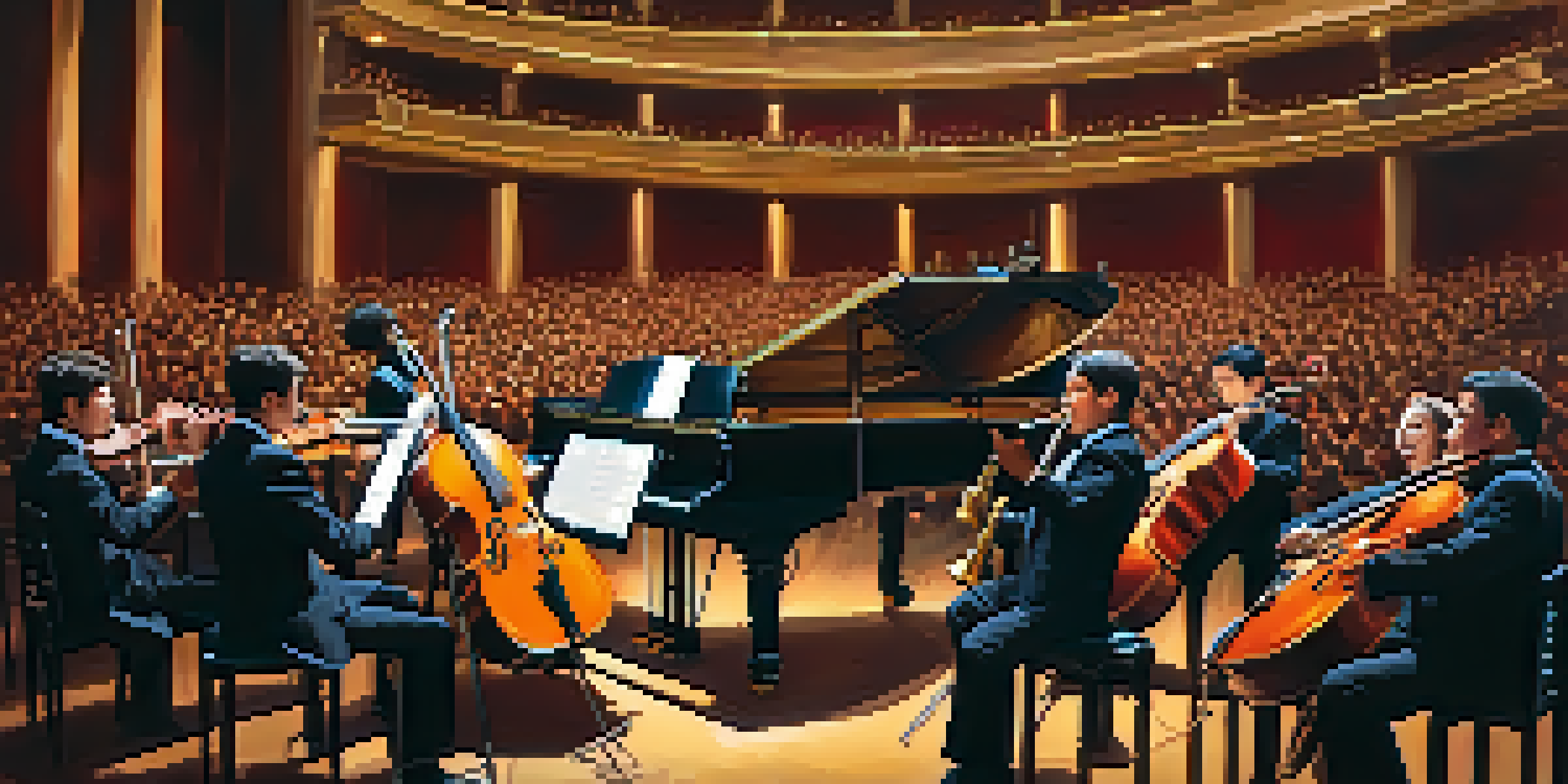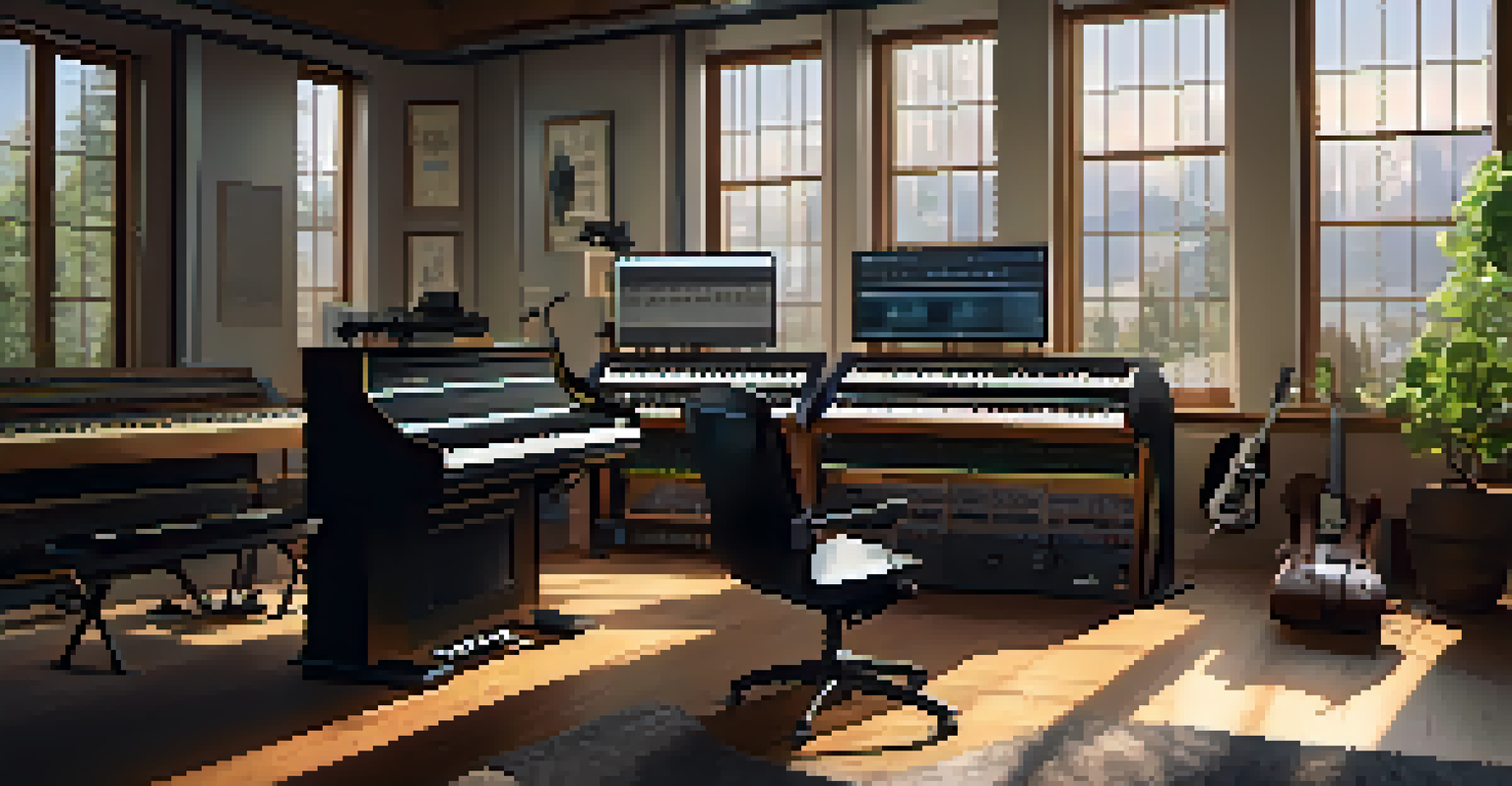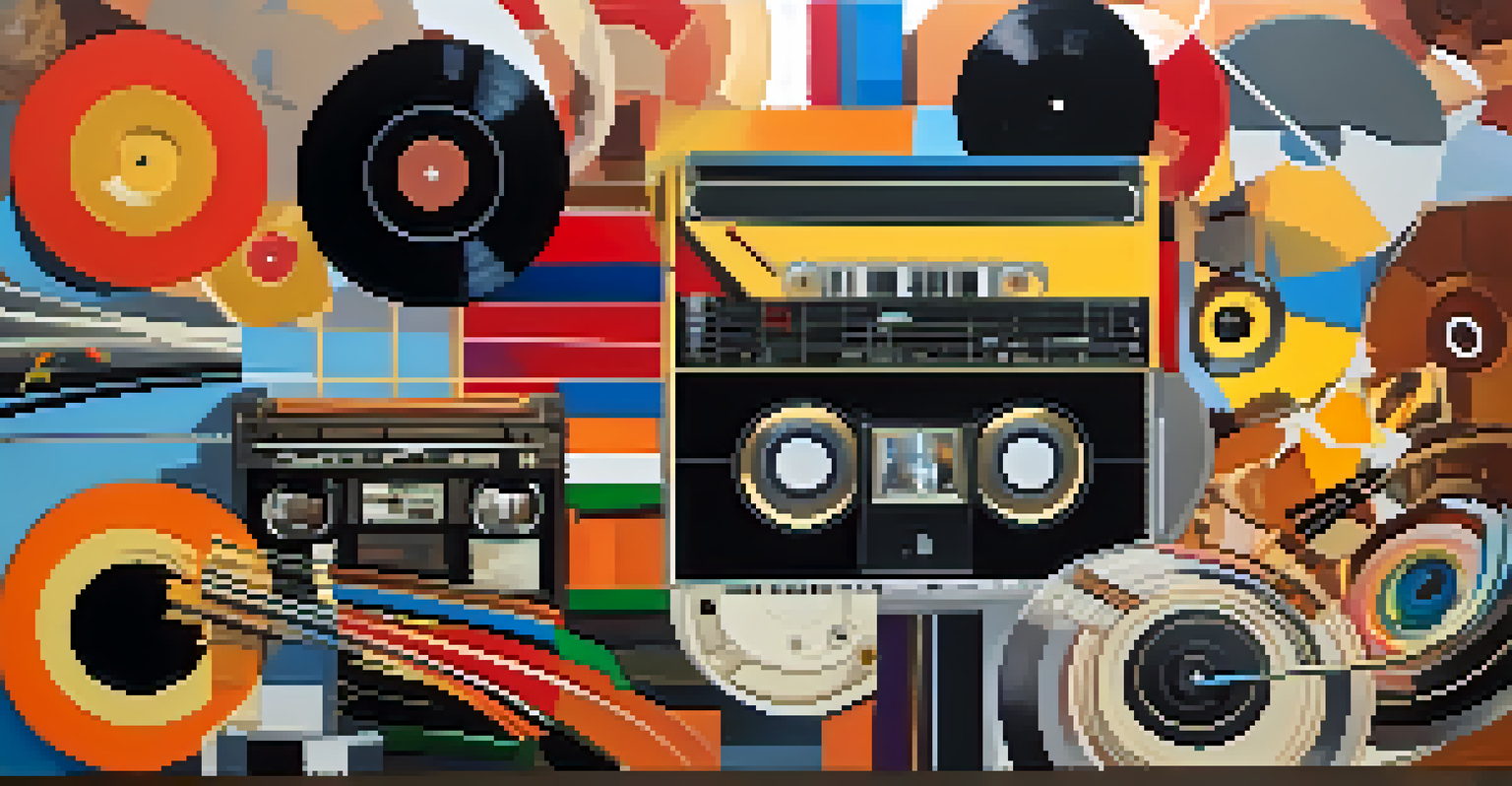Analyzing Iconic Film Scores and Their Impact on Cinema

The Evolution of Film Scores Through the Decades
Film scores have undergone significant changes since the early days of cinema. Initially, silent films relied on live musicians to enhance storytelling through music. As technology advanced, composers began to create original scores that complemented the film narrative, making the music an integral part of the cinematic experience.
Music is the shorthand of emotion.
In the 1930s and 1940s, orchestral scores became prominent, with composers like Max Steiner and Erich Wolfgang Korngold setting the standard for epic soundtracks. This era paved the way for the lush orchestration that audiences now associate with classic films, creating an emotional depth that silent films could only hint at.
By the time we reached the late 20th century, film scores had evolved into diverse styles, from minimalist compositions to rock-infused soundtracks. This evolution reflects the changing tastes of audiences and the desire for composers to push creative boundaries, demonstrating that film music is as dynamic as the films themselves.
Understanding the Role of Composers in Film
Composers play a crucial role in shaping the emotional landscape of a film. They work closely with directors to ensure their vision is translated into sound, weaving themes and motifs that resonate with the audience. This collaboration can often determine whether a scene is perceived as tense, romantic, or triumphant.

Take John Williams, for example, whose scores for 'Star Wars' and 'Jurassic Park' are not just background music but characters in their own right. His ability to create memorable themes that evoke specific emotions has set a benchmark for film scoring. When audiences hear these iconic melodies, they are instantly transported back to the worlds these films create.
Film Scores Evolve with Technology
Advancements in technology have transformed film scoring, allowing composers to create diverse and innovative sounds.
Moreover, a skilled composer can elevate a mediocre film into something extraordinary. The right score can instill a sense of urgency or nostalgia, proving that music is not merely an accessory but a vital component of storytelling in cinema.
Iconic Film Scores That Changed Cinema
Some film scores have become synonymous with the films themselves, transcending their original context to become cultural phenomena. Think of 'Titanic' and its haunting theme, 'My Heart Will Go On,' which not only defined the film but also became a global hit. This illustrates how scores can enhance a film's legacy and reach beyond the screen.
Film is a powerful medium for storytelling, and music is its emotional heartbeat.
Another example is 'The Godfather' with its melancholic yet powerful score by Nino Rota. The music captures the essence of the film's themes of family, power, and betrayal, making it unforgettable. Such iconic scores often define the emotional core of the story, creating a lasting impact on audiences.
These scores have influenced countless other filmmakers and composers, emphasizing the importance of music in film. The way these iconic pieces resonate with viewers has set a standard for future film scores, proving that great music can elevate a film to legendary status.
How Music Evokes Emotion in Film
Music has a unique ability to evoke emotions, and film scores are expertly crafted to tap into this power. Composers use various techniques, such as tempo, harmony, and instrumentation, to create emotional responses that align with the film's narrative. For instance, a fast-paced score can heighten tension during a suspenseful scene, while a soft melody can evoke sadness during a poignant moment.
Consider the use of silence in conjunction with music. Often, the absence of sound can intensify the impact of a subsequent musical cue, making it resonate even more with the audience. This clever manipulation of sound and silence exemplifies how scores can guide viewers through the emotional journey of a film.
Composers Shape Film Emotions
The collaboration between directors and composers is crucial in crafting scores that evoke specific emotional responses in audiences.
Ultimately, the emotional connection forged between the audience and the film is often made stronger by the score. Music acts as a bridge, enhancing the storytelling and ensuring that key moments linger in the viewer's memory long after the credits roll.
The Influence of Genre on Film Scoring
The genre of a film significantly influences its score, with different styles and techniques employed to create specific atmospheres. For example, horror films often utilize dissonant harmonies and unsettling sound effects to evoke fear and tension. In contrast, romantic comedies tend to feature light, melodic themes that elicit joy and warmth.
This genre-specific scoring helps set audience expectations and enhances their experience. For instance, a suspenseful score in a thriller can keep viewers on the edge of their seats, while an uplifting score in a feel-good movie can make them feel elated. The music acts as a cue, guiding emotions in a direction that aligns with the film's intent.
Moreover, composers often draw inspiration from the conventions of their respective genres, which can lead to innovative and fresh approaches. This interplay between genre and scoring not only enriches the film but also keeps the audience engaged, as they anticipate how the music will complement the unfolding story.
The Impact of Technology on Film Scores
Advancements in technology have revolutionized how film scores are composed, recorded, and produced. With digital audio workstations and software synthesizers, composers now have access to a vast array of sounds and tools that enhance their creative process. This has led to more diverse and experimental scores, as composers explore new sonic landscapes.
The use of technology also allows for greater precision in recording and mixing. Composers can now layer multiple tracks, manipulate sounds, and create intricate arrangements that were previously difficult to achieve. This level of control enables them to craft scores that perfectly align with the film's visual elements and emotional beats.
Genre Influences Scoring Styles
The genre of a film significantly dictates the scoring techniques used, enhancing the overall viewer experience.
However, while technology has expanded the possibilities for film scoring, it also raises questions about authenticity. Some argue that reliance on digital tools can detract from the human touch that live orchestras bring. Still, the blend of traditional and modern techniques continues to push the boundaries of what film music can achieve.
Future Trends in Film Scoring
As cinema continues to evolve, so too will the world of film scoring. We are witnessing a trend towards more collaborative efforts, where composers team up with artists from various genres, including pop, electronic, and even hip-hop. This fusion not only brings fresh sounds to film but also attracts a broader audience.
Additionally, the rise of streaming services has changed the landscape for film scores. With more content being produced, there's a greater demand for diverse musical styles that cater to different viewer demographics. This shift opens up opportunities for lesser-known composers to showcase their talents and contribute to the cinematic experience.

Looking ahead, we can expect to see innovations in virtual reality and interactive storytelling, where music plays a critical role in shaping the viewer's experience. The future of film scoring is bright and filled with potential, as composers continue to explore new ways to connect with audiences through the power of music.